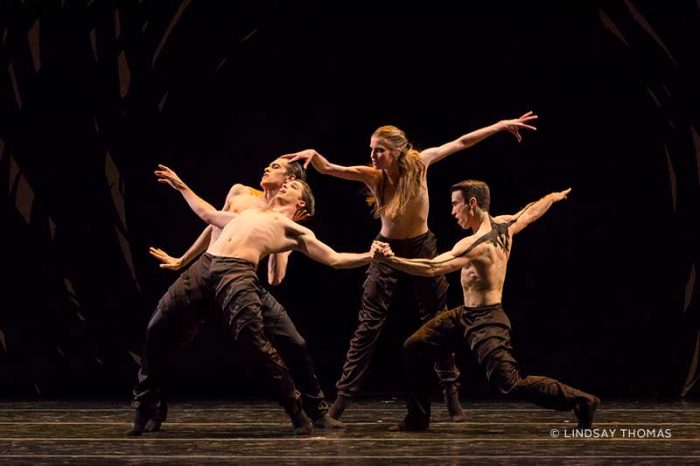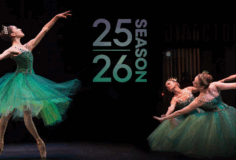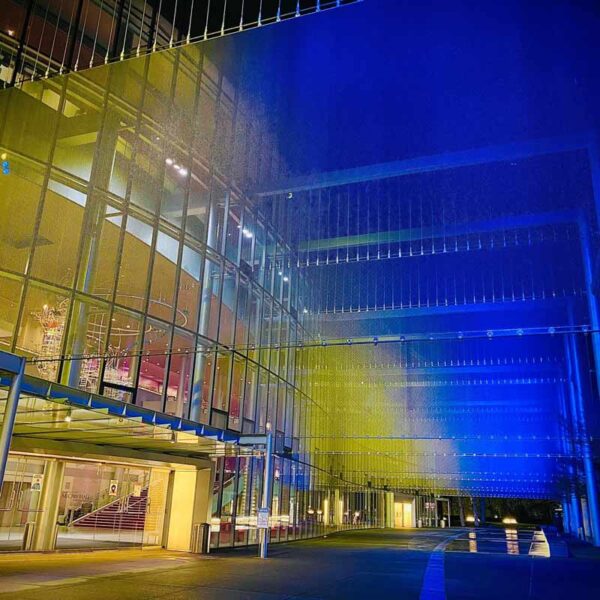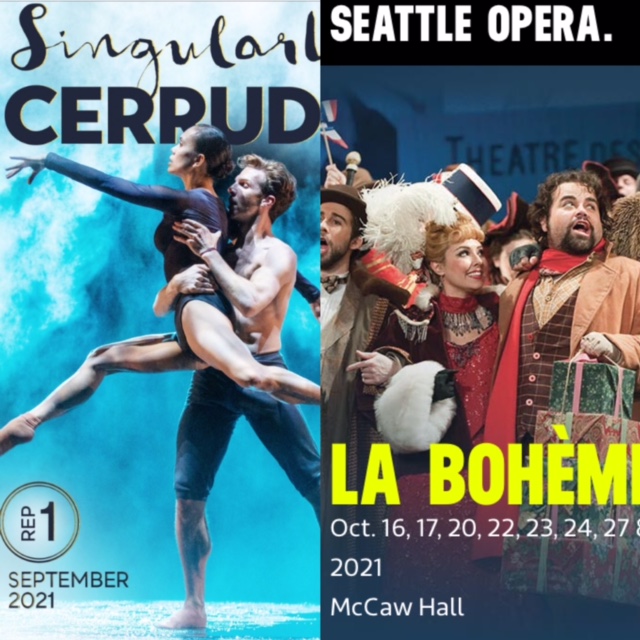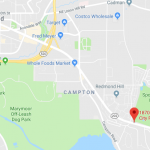Via Pacific Northwest Ballet press release:
“Every ballet company in the world wants a work by choreographer Crystal Pite.” –The Guardian
SEATTLE, WA – For EMERGENCE, the penultimate program of its 45th season, Pacific Northwest Ballet brings back two audience favorites and the Seattle premiere of a powerful new work. The trio of blockbusters includes Crystal Pite’s mesmerizing Emergence, her stunning vision of hive intelligence; and Alejandro Cerrudo’s cinematic Little mortal jump, a work by turns playful, potent, and poignant. The program’s premiere is RAkU, PNB’s first work by Yuri Possokhov, whose tale of desire and loyalty captivates with its character portrayals and intriguing design layered with digital projection. EMERGENCE runs for seven performances only, April 13 through 22 at Seattle Center’s Marion Oliver McCaw Hall. Tickets start at $37. For more information, contact the PNB Box Office at 206.441.2424, in person at 301 Mercer Street, or online at PNB.org. [Audience advisory: RAkU contains themes of sexual violence.]
The line-up for EMERGENCE will include:
Little mortal jump
Music: Beirut (“A Call to Arms” and “La Banlieue”), Andrew Bird’s Bowl of Fire (“Beware”), Alexandre Desplat (“See How They Fall—Dans Les Champs De Ble” and “A Self-made Hero—Theme de Heroes”), Philip Glass (“Glassworks/Analog: Orange Mountain Music Archive: Closing”), Max Richter (“The Haunted Ocean 5” and “November”), Tom Waits and Kathleen Brennan (“Fawn”)
Choreography: Alejandro Cerrudo
Staging: Pablo Piantino
Scenic Design: Alejandro Cerrudo
Costume Design: Branimira Ivanova
Lighting Design: Michael Korsch
Running Time: 26 minutes
Premiere: March 15, 2012; Hubbard Street Dance Chicago
PNB Premiere: March 18, 2016
The 2016 Pacific Northwest Ballet premiere of Alejandro Cerrudo’s Little mortal jump was generously underwritten by Jeffrey & Susan Brotman. The 2018 production is generously supported by Peter & Peggy Horvitz.
Little mortal jump, resident choreographer Alejandro Cerrudo’s tenth piece for Hubbard Street Dance Chicago, is a bubbling blend of different styles and genres that distills into a fluid, cohesive whole. As a dance, it fuses the technicality of movement, the theatricality of the stage, and the dark humor inherent in relationships. As an experience, Cerrudo aims to transport his audience—to “make them forget what they did today, and what they will do tomorrow,” he says. From cubes that serve as frames and obstructions to diversely characterized couples to vastly contrasting music, Little mortal jump is layered with unexpected twists and turns. This work is a step in the evolution of Cerrudo’s choreographic style, of which he says, “I challenge myself to create more complex works and to do things that I haven’t done before.” [Notes courtesy of Hubbard Street Dance Chicago.]
RAkU (PNB Premiere)
Music: Shinji Eshima (2011)
Libretto: Gary Wang
Choreography: Yuri Possokhov
Staging: Quinn Wharton
Scenic and Projection Design: Alexander V. Nichols
Costume Design: Mark Zappone
Lighting Design: Christopher Dennis
Running Time: 36 minutes
Premiere: February 3, 2011; San Francisco Ballet
The 2018 Pacific Northwest Ballet premiere of Yuri Possokhov’s RAkU is generously supported by Aya Stark Hamilton, Glenn Kawasaki, Sharon Lee, Ms. Jodi Wong, and Leslie & Tachi Yamada.
Audience advisory: RAkU contains themes of sexual violence.
RAkU is a story about love and separation, desire and jealousy, violence and grief, told by choreographer Yuri Possokhov to stunning effect. Based on the true story of the burning of Kyoto’s Golden Pavilion in 1950, RAkU is set in a much earlier time and in a style similar to Noh theater, which presents the essence of a story rather than a literal depiction. Possokhov’s imaginative approach to the story, a commissioned score, and the dramatic projection-based scenery combine to make a perfectly melded artistic whole, telling the story of a princess, her warrior husband, and a monk.
Despite its Japanese story and setting, RAkU contains no traditional Japanese dance or music; Possokhov is more interested in tone, aesthetics, and visual inventiveness than in reenacting history. Combining folk-based steps and butoh (a post-World War II Japanese dance form utilizing extremely slow movements) with classically based movement, he makes every emotion in the ballet visual and vivid. And although the commissioned score by Shinji Eshima is symphonic and uses no Japanese instruments, it conveys a Japanese feeling, and one section incorporates a Buddhist chant. [Notes (excerpted) by Cheryl A. Ossola. Ms. Ossola’s notes for RAkU were originally written for San Francisco Ballet in 2011 and have been revised by the author for Pacific Northwest Ballet. For Ms. Ossola’s complete notes, visit PNB.org.]
Emergence
Music: Owen Belton (2009)
Choreography: Crystal Pite
Staging: Hope Muir
Scenic Design: Jay Gower Taylor
Costume Design: Linda Chow
Lighting Design: Alan Brodie
Running Time: 28 minutes
Premiere: March 4, 2009; National Ballet of Canada (Toronto)
PNB Premiere: November 8, 2013
Principal support for the 2013 Pacific Northwest Ballet premiere of Crystal Pite’s Emergence was generously provided by Marcella McCaffray.
Crystal Pite is known as one of the most innovative and exciting choreographers at work today. National Ballet of Canada artistic director Karen Kain commissioned Pite to create an original work for the company as part of a program of new work by Canadian choreographers. The result, Emergence, brought audiences to their feet and went on to win four Dora Mavor Moore Awards for Outstanding Production, Outstanding New Choreography, Outstanding Performance and Outstanding Sound Design/Composition by Owen Belton.
A riveting dark-hued work that casts a swarming, scurrying group of dancers, insect-like, in an eerily subterranean universe, Emergence dramatizes through its mesmerizing choreographic attack the ways in which the instinct for creating social forms seems hard-wired into life itself. Pite’s inspiration for the work came from reading Emergence: The Connected Lives of Ants, Brains, Cities and Software by American popular science theorist Steven Johnson and considering parallels between the social organization of bees and the hierarchical nature of classical ballet companies.
Johnson’s statement that “simple agents following simple rules could generate amazingly complex structures” became a touchstone for the piece. Pite was interested in individual expression and in collective problem solving through movement, often favoring the visual and kinesthetic appeal of the eccentric over the mundane and the grotesque over the beautiful. Pite rarely works with dancers en pointe and was attracted not only to the dancers’ ease of movement but also to the potential for a creature-like effect.
Key to Pite’s vision for Emergence was her collaboration with composer Owen Belton, who uses both acoustic and electronic instruments, often in combination with computer processing techniques, to arrive at atmospheric palettes of sound and tone. Pite and Belton incorporated drone-like sounds of bees along with sounds of marching to signify the power and ominous presence of the body politic. [Notes courtesy of National Ballet of Canada. For more information, visit PNB.org.]
PACIFIC NORTHWEST BALLET PRESENTS: EMERGENCE
April 13 – 22, 2018
Marion Oliver McCaw Hall
321 Mercer Street at Seattle Center
Seattle, WA 98109
Seven Performances Only!
April 13 at 7:30 pm
April 14 at 2:00 and 7:30 pm
April 19 – 21 at 7:30 pm
April 22 at 1:00 pm
TICKET INFORMATION & DISCOUNT OFFERS
Tickets ($37-$187) may be purchased through the PNB Box Office:
- Phone – 206.441.2424
- In Person – 301 Mercer Street, Seattle
- Online – PNB.org (24/7)
Subject to availability, tickets are also available 90 minutes prior to showtimes at McCaw Hall.
GROUP SALES
Discounts are available for groups of 10 or more. For group tickets, please call Group Sales Manager Julie Jamieson at 206.441.2416, email JulieJ@PNB.org or use PNB’s online contact form at PNB.org/Season/Group-Tickets.
GET THE POINTE
The Pointe is PNB’s exclusive mailing list for ballet fans between the ages of 20 and 40. Members of The Pointe receive information about special events and flash sales just for them. Born between 1978 and 1998? Visit PNB.org/ThePointe for more information and to sign up.
TEENTIX
PNB is a proud participant of TeenTix. Originally founded by Seattle Center, TeenTix’s members (13 to 19 years old) can purchase tickets to PNB and other music, dance, theater and arts events around town for only $5. To join TeenTix or view a list of participating organizations, visit TeenTix.org.
STUDENT AND SENIOR RUSH TICKETS
Subject to availability, half-price rush tickets for students and senior citizens (65+) may be purchased in-person with ID, from 90 minutes prior to show time at the McCaw Hall box office.
SPECIAL EVENTS
BALLET 101: Contemporary Ballet – New Works and Current Trends in Ballet
Tuesday, April 10, 7:00 pm
The Phelps Center, 301 Mercer St., Seattle
Artistic Director Peter Boal and PNB’s ballet masters discuss the season’s works, what makes them contemporary, the diversity of styles, and the multiple demands on dancers and staff in preparing new work. This is the third of a four-part series exploring a range of topics, from ballet terminology, steps and partnering, to casting, contemporary works, and the business of ballet. Tickets are $25 per session. For more info, visit PNB.org.
PNB CONVERSATIONS & DRESS REHEARSAL
Thursday, April 12
Nesholm Family Lecture Hall at McCaw Hall
Join PNB Audience Education Manager Doug Fullington in conversation with RAkU choreographer Yuri Possokhov, during the hour preceding the dress rehearsal. The conversation begins at 6:00 pm, followed by the dress rehearsal at 7:00 pm. Tickets ($30) may be purchased through the PNB Box Office.
BALLET TALK
Nesholm Family Lecture Hall at McCaw Hall
Join Audience Education Manager Doug Fullington for a 30-minute introduction to each performance, including discussions of choreography, music, history, design and the process of bringing ballet to the stage. One hour before performances. FREE for ticketholders.
MEET THE ARTISTS
Nesholm Family Lecture Hall at McCaw Hall
Skip the post-show traffic and enjoy a Q&A with Artistic Director Peter Boal and PNB dancers, immediately following each performance. FREE for ticketholders.
YOUNG PATRONS CIRCLE NIGHT
Friday, April 20, 2015, 7:30 pm
Join members of PNB’s Young Patrons Circle (YPC) in an exclusive lounge for complimentary wine and coffee before the show and at intermission. YPC is PNB’s social and educational group for ballet patrons ages 21 through 39. YPC members save up to 40% off their tickets. For more info, visit PNB.org/YPC.
ABOUT THE ARTISTS
Alejandro Cerrudo was born in Madrid, Spain, and trained at the Real Conservatorio Profesional de Danza de Madrid. His professional career began in 1998 and included work with Victor Ullate Ballet, Stuttgart Ballet, and Nederlands Dans Theater 2. Mr. Cerrudo joined Hubbard Street Dance Chicago in 2005, was named choreographic fellow in 2008, and became the company’s first resident choreographer in 2009. His thirteen works for Hubbard Street include collaborations with the Chicago Symphony Orchestra and Nederlands Dans Theatre. In March 2012, PNB invited Mr. Cerrudo to choreograph his first work for the company, Memory Glow, upon receiving the Joyce Theater Foundation’s second Rudolf Nureyev Prize for New Dance. Additional honors include an award from the Boomerang Fund for Artists (2011) and a Prince Prize, from the Prince Charitable Trusts (2012), for his first full-length, One Thousand Pieces. Mr. Cerrudo is one of four choreographers invited by New York City Ballet principal Wendy Whelan to create and perform original duets for “Restless Creature,” and in 2014, he was announced the 2014 USA Donnelley Fellow by United States Artists.
Shinji Eshima (Composer, RAkU), born in Berkeley and a graduate of Stanford and Juilliard, is a double-bassist in the SF Ballet Orchestra (SFBO) and San Francisco Opera Orchestra. He is a faculty member at San Francisco State University and San Francisco Conservatory of Music. His compositions include music for theater, film, chamber music, opera, and Buddhist hymns. His first commission for SF Ballet, Possokhov’s RAkU, was recorded by SFBO at Skywalker studio and released on CD and iTunes. In 2011, the city of Berkeley named December 6 as “Shinji Eshima Day” in his honor for his contributions to the arts.
After training at the Moscow Ballet Academy, Yuri Possokhov danced with the Bolshoi Ballet for ten years, where he was promoted to principal dancer. In 1992, he joined Royal Danish Ballet as a principal dancer, then joined San Francisco Ballet as a principal dancer in 1994. His final engagement as an SF Ballet principal dancer was in 2006. As a choreographer, Possokhov has created 15 ballets for SF Ballet. In addition he has created works for the Bolshoi Ballet, Georgian National Ballet, The Joffrey Ballet, and Oregon Ballet Theatre. He was named SF Ballet Choreographer in Residence in 2006.
Crystal Pite is a former company member of Ballet British Columbia and William Forsythe’s Ballett Frankfurt. She made her professional choreographic debut in 1990 with Ballet British Columbia, and has since created more than 40 works for companies including Nederlands Dans Theater (where she has been an Associate Artist since 2008), Paris Opera Ballet, the Royal Ballet, Cullberg Ballet, Ballett Frankfurt, the National Ballet of Canada, Les Ballets Jazz de Montréal (where she was Resident Choreographer 2001–04), Cedar Lake Contemporary Ballet, and Louise Lecavalier/Fou glorieux. She is an Associate Dance Artist of Canada’s National Arts Centre and in 2013, was made an Associate Artist of Sadler’s Wells.
Ms. Pite formed her company Kidd Pivot in 2002. Incorporating movement, original music, text, and rich visual design, Kidd Pivot’s distinct choreographic language is marked by a strong theatrical sensibility and a keen sense of wit and invention. The company has won international acclaim with such works as Dark Matters, Lost Action, The You Show, The Tempest Replica, and Betroffenheit. Ms. Pite’s many awards include the Dora Mavor Moore Award (2009, 2012), a Jessie Richardson Theatre Award (2006), the 2008 Governor General of Canada’s Performing Arts Award, the 2011 Jacob’s Pillow Dance Award, the inaugural Lola Award in 2012, Canada Council’s 2012 Jacqueline Lemieux Prize, two Olivier Awards (2015 for Polaris, and 2017 for Betroffenheit, and the 2017 Benois de la Danse for The Seasons’ Canon.


